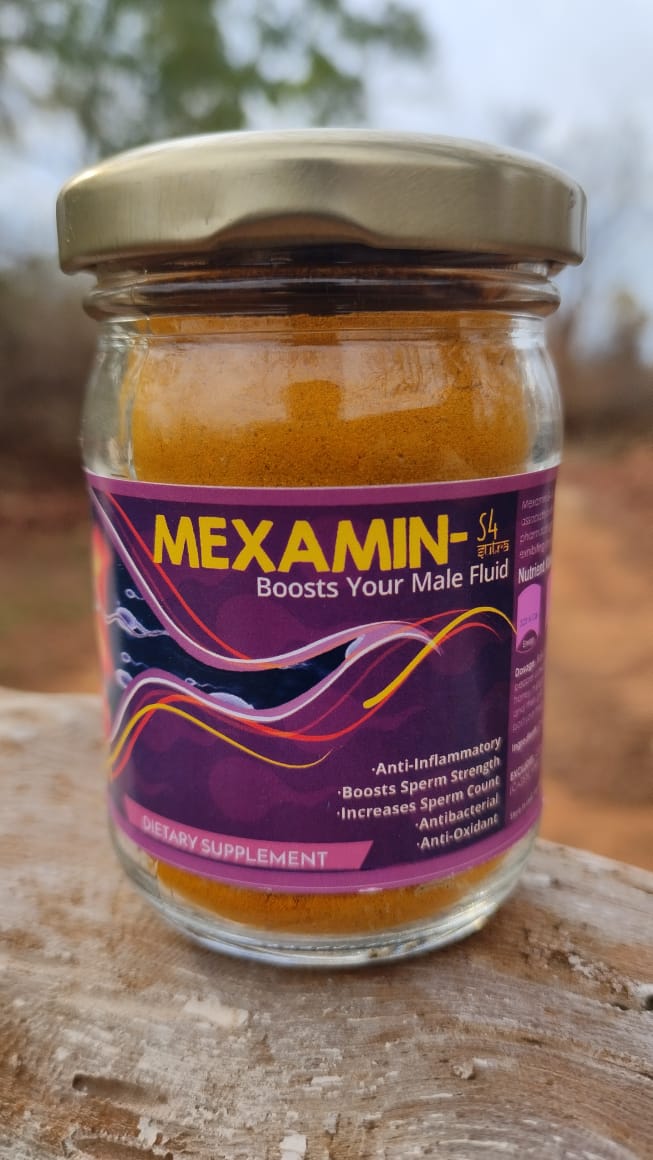Introduction:
In recent years, the use of natural remedies and supplements has gained popularity among people. One such remedy that has caught the attention of many is turmeric. This spice, known for its anti-inflammatory and antioxidant properties, has been found to have potential benefits for male fertility. In this blog post, we will explore the effectiveness of turmeric as a treatment for increasing sperm quality and sperm count.
Table of Contents:
- What is Turmeric?
- Turmeric and Male Fertility
- How Turmeric Affects Sperm Quality and Count
- The Science Behind Turmeric’s Effect on Male Fertility
- Introducing Mexamin-S4: Our Turmeric Based Dietary Supplement for Improving Sperm Count and Strength
- How to Use Mexamin-S4 for Improving Sperm Quality and Sperm Count
- Conclusion
What is Turmeric?
Turmeric is a spice that comes from the turmeric plant, which is native to Southeast Asia. It is commonly used in cooking and has a bright yellow color. Turmeric has been used in traditional medicine for centuries due to its anti-inflammatory and antioxidant properties.
Turmeric and Male Fertility
Male infertility is a growing concern in today’s world, with many couples struggling to conceive. While there are several treatments available, some people are turning to natural remedies such as turmeric to improve their chances of conception. Turmeric has been found to have potential benefits for male fertility, specifically in improving sperm quality and count.
How Turmeric Affects Sperm Quality and Count
Studies have shown that turmeric may have a positive effect on sperm quality and count. The active compound in turmeric, curcumin, has been found to have antioxidant and anti-inflammatory properties, which can protect sperm from damage and improve their motility. Additionally, turmeric may also help regulate hormone levels, which can improve the production of healthy sperm.
The Science Behind Turmeric’s Effect on Male Fertility
Research has shown that turmeric can have a positive effect on male fertility. One study found that men who took a turmeric supplement had a significant increase in sperm count, motility, and morphology. Another study found that curcumin could improve the function of the testicles, which are responsible for producing sperm.
Introducing Mexamin-S4: Our Turmeric Based Dietary Supplement for Improving Sperm Count and Strength
At our company, we have developed a dietary supplement called Mexamin-S4 that is specifically designed to improve sperm quality and count. Mexamin-S4 is made from medicinal grade turmeric, which we cultivate ourselves in the middle of a Tiger Reserve called Bandhavgarh. This ensures that our turmeric is of the highest quality and purity.
How to Use Mexamin-S4 for Improving Sperm Quality and Sperm Count
To get the best results from Mexamin-S4, we recommend taking two capsules per day with water. We may advice a different dosage if you decide on using the powder. Mexamin-S4 powder is more effective then the capsules. Mexamin-S4 should be taken regularly for a period of at least three months to see significant improvements in sperm quality and count.
Conclusion
Turmeric has been found to have potential benefits for male fertility, specifically in improving sperm quality and count. At our company, we have developed a dietary supplement called Mexamin-S4 that is made from medicinal grade turmeric and is specifically designed to improve sperm quality and count. If you are struggling with male infertility, we highly recommend trying Mexamin-S4 for a safe and natural way to improve your chances of conception.

10 frequently asked questions (FAQs) about turmeric as an effective treatment for increasing sperm quality and sperm count:
- How does turmeric improve sperm quality and count? Turmeric contains an active compound called curcumin, which has antioxidant and anti-inflammatory properties that can protect sperm from damage and improve their motility. Turmeric may also help regulate hormone levels, which can improve the production of healthy sperm.
- How long does it take to see results from using turmeric for male fertility? Results from using turmeric for male fertility may vary, but it is generally recommended to use it consistently for a period of at least three months to see significant improvements in sperm quality and count.
- Can turmeric supplements have any negative side effects on male fertility? While turmeric supplements are generally considered safe, it is important to consult with a healthcare professional before taking any new supplements or making changes to your diet. Turmeric may interact with certain medications, so it is important to discuss this with your healthcare provider.
- Is it safe to use Mexamin-S4 while trying to conceive? Mexamin-S4 is made from medicinal grade turmeric and is safe to use while trying to conceive. However, it is still recommended to consult with a healthcare professional before taking any new supplements.
- Can turmeric improve sperm morphology? Some studies have shown that turmeric may improve sperm morphology, or the size and shape of sperm. However, more research is needed in this area.
- Does cooking with turmeric have the same benefits as taking a supplement? While cooking with turmeric can provide some health benefits, taking a supplement may be a more effective way to see significant improvements in sperm quality and count.
- Can turmeric supplements improve overall male fertility? Turmeric supplements may have the potential to improve overall male fertility, as they can improve sperm quality and count. However, it is important to consult with a healthcare professional before taking any new supplements.
- Can turmeric supplements be taken with other supplements or medications? Turmeric supplements may interact with certain medications, so it is important to consult with a healthcare professional before taking any new supplements or making changes to your diet.
- Is Mexamin-S4 vegan-friendly? Yes, Mexamin-S4 is vegan-friendly and does not contain any animal products.
- Can turmeric supplements help with other health issues? Turmeric supplements have been found to have potential benefits for several health issues, including reducing inflammation, improving brain function, and lowering the risk of certain chronic diseases. However, more research is needed in these areas.

